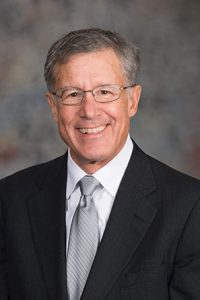Renewable energy standard for public power suppliers considered
The Natural Resources Committee heard testimony Feb. 13 on a bill that would require Nebraska public power suppliers to generate a certain amount of their electricity from renewable sources by the end of the decade.
Under LB1205, introduced by Omaha Sen. John McCollister, public power suppliers would place renewable electric power generation capacity in service in three stages by building or acquiring renewable energy production facilities or by entering into contracts to purchase electricity from renewable energy production facilities.
“LB1205 would ensure Nebraskans that electric utilities will be doing the best they can for our citizens and for our environment,” McCollister said.
The bill would require a supplier to have a renewable electric power generation capacity equal to 35 percent of its median annual generation for 2019 through 2020 in service by the end of 2022.
It would require a supplier to have a capacity equal to 55 percent of its median annual generation for 2023 through 2025 in service by the end of 2026 and a capacity equal to 75 percent of its median annual generation for 2027 through 2029 in service by the end of 2030.
In addition to solar and wind energy facilities, the bill would include demand-side management, waste management, cogeneration, agricultural crop residue energy generation and wood burning facilities in a list of renewable energy generation facilities. The definition excludes any form of waste incineration for energy recovery.
McCollister brought an amendment to the hearing that he said would allow a public power supplier’s board of directors to opt out if they decide that complying with the proposed requirements would affect the reliable operation of its power system.
He said the amendment also would add nuclear power plants to the proposed list of renewable energy generation facilities.
Katie Torpy testified in support of LB1205 on behalf of the Nature Conservancy, saying it would “set Nebraska on a clear path away from fossil fuels” and reduce the greenhouse gas emissions that are a major cause of climate change.
“Clearly we’re not on track to achieve the aggressive emissions reductions needed to avoid the worst impacts of climate change,” she said. “Taking this action would reduce greenhouse gas emissions and hopefully stave off the worst consequences.”
David Corbin testified in support of the bill on behalf of the Public Health Association of Nebraska. He said a 2015 American Public Health Association policy advocates for transitioning to renewable energy sources and eliminating coal-fired power plants because it would save thousands of lives by preventing respiratory conditions such as asthma.
Also in support was Kristen Ohnoutka, a research fellow at a renewable energy development organization. She said Nebraska has “tremendous potential” for renewable energy generation but remains one of the few states that has not set a renewable energy generation standard.
Between 2006 and 2016, Ohnoutka said, Nebraska was the only state to increase its investment in coal.
“A renewable standard sends a message to renewable energy companies, investors and private corporations that Nebraska is a serious place to do business,” she said.
Shelly Sahling-Zart, vice president and general counsel of Lincoln Electric System, testified in opposition to LB1205 on behalf of the Nebraska Power Association. She said the proposed timeline is “incredibly aggressive” because utility-scale battery storage technology is not widely available yet.
Sahling-Zart said the proposal would take power away from locally elected public power boards that must consider the cost, safety and reliability of transitioning to additional renewable electric generation capacity.
Some public power suppliers, including the Omaha Public Power District, already have set goals to reduce the amount of electricity they generate using fossil fuels, she said, and one-third of the LES portfolio now includes renewable sources.
Also testifying in opposition was Kristen Gottschalk, government relations director for the Nebraska Rural Electric Association. She said the bill’s “aggressive timeline” would be impossible for NREA members to meet without significantly increasing costs to customers.
Gottschalk said LB1205 also would not address the loss of jobs or stranded investments associated with the likely closure of coal-fired power plants.
“Does the bill really intend to create a renewable energy portfolio,” she said, “or is it intended to create job security for renewable resource developers?”
The committee took no immediate action on the bill.

